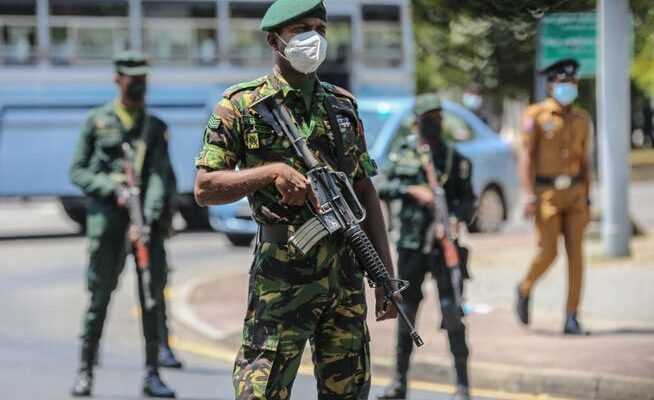The government in Sri Lanka is coming under increasing pressure due to the ongoing economic crisis. A state of emergency was declared in the country.
Empty streets and a lot of military presence in Colombo after the declaration of the state of emergency.
The young women have positioned themselves at the end of the driveway, just so that their feet do not touch the street. “We have enough,” says Do Perara, 23, who lives in one of the houses behind the driveway. She is demonstrating on her doorstep. Her sign reads: “We won’t let you get away”. Sri Lanka declared a state of emergency over the weekend. A curfew was in place across the island on Saturday and Sunday and social media was no longer accessible.
The government around Gotabaya Rajapaksa wanted to prevent demonstrations at all costs, police patrolled through a deserted Colombo on Sunday. And yet there were protests, on Sunday afternoon people stood at house entrances, driveways, street corners, armed with signs. Keyasha Siriwardana, 26, is demonstrating next to Do Pererra, she says: “It’s the first time that our generation is taking to the streets in Sri Lanka.” Despite the restrictions, more than 20,000 people protested across the country.
The economic crisis in Sri Lanka has escalated dramatically over the past few days. Buses, trucks and cars are backed up for miles in front of the petrol stations, people need diesel for their vehicles and generators and have to queue for up to three days. The crisis is not only affecting the poorest, but now also the middle and upper classes, such as Perrera and Siriwardena, who live just outside the city centre. “We don’t have diesel to drive to work. We should work from home. But because of the power outages, we don’t have internet,” says Siriwardena. Over the weekend, parts of Sri Lanka lost power for up to 13 hours.
With their courage, the demonstrators have now achieved at least a partial success: on Monday, almost all ministers submitted their resignations. Among the outgoing ministers were two of the president’s relatives, brother and finance minister Basil Rajapaksa, and nephew and sports minister Namal Rajapaksa.
Ruled by a family
Sir Lanka’s economic crisis has been smoldering for months. After the terrorist attacks in spring 2019, fewer tourists traveled to the country with their much-needed foreign currency. During the pandemic, tourism came to a complete standstill. Shortly before the Covid-19 crisis, Sri Lanka had elected Gotabaya Rajapaksa as President and installed his brother Mahinda as Prime Minister. Both made a name for themselves in the civil war. Mahinda was president when the government used all its violence to crush the Tamil rebels in 2009. Meanwhile, several family members are in the highest government offices, such as the now resigned finance minister, his brother Basil Rajapaksa.
Even after the collapse of tourism, the Rajapaksa government did not think about saving. On the one hand, she spent a lot of money on Corona aid. On the other hand, she gave away tax gifts that she had promised during the election campaign. In addition, there were decisions that were difficult to understand, such as the sudden import ban on pesticides and fertilizers. Because the farmers lost almost half their harvest, the government later lifted the ban. However, the damage could no longer be repaired: the crop failures are partly responsible for the high food prices on the island.
Meanwhile, the international rating agencies Sri Lanka missed such bad gradesthat nobody wants to lend the country any more money. The risk that Sri Lanka will not be able to repay the debt is too great. Only China and India have promised aid packages – both of which have already lent Sri Lanka billions of dollars in the past year. People fled from Sri Lanka’s north by boat to nearby India, so great is the despair. There were riots in front of the President’s house on Thursday, and the police suppressed the demonstration.
The International Monetary Fund writes in his latest report: “The government has presented measures to get the crisis under control, but it is unlikely that these will put the economy back on a stable and sustainable path.”
“Enough is enough”
“We have no government. We have a Rajapaksa cartel in power,” says Chandima Wijesekera, 41. He owns a cinnamon and coconut plantation in southern Sri Lanka and because they had no fertilizer this year, the plants are not growing. Wijesekera lives in a modern apartment block with a rooftop pool and garden, it’s a privileged life. Now he has gathered at the entrance with around 30 neighbors, one of them shouts: “We shouldn’t go too far into the street.” It’s civil disobedience on the doorstep, at least something, people say here. Sri Lankans violating curfew are arrested.
Neighbors bang pans and wave Sri Lankan flags. “I’ve never protested in my life, I’ve never taken to the streets for anything. But enough is enough,” says Wijesekera, “what kind of country do I want to leave my daughter?”
